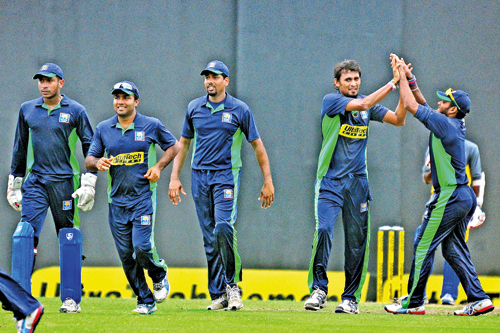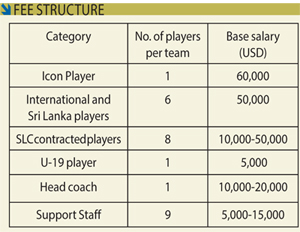LPL set to take-off on August 28 sans glamour

LPL will hopefully bring back the competitiveness amongst local talents - File pic
There will be no glamour and grandeur of a typical T20 cricket tournament. Health requirements will likely keep spectators out of stadiums. But when the Lanka Premier League (LPL) finally takes off on August 28, there will be many glued to their TV sets for a glimpse of the action in the middle.
Sri Lankans have been starved of cricket since February when several scheduled tours were postponed due to the global health crisis. Any cricket now will be like manna from heaven for players and fans alike.
“We are hoping to get at least 10-20 per cent of the full capacity to the venues but this depends on health authorities,” said Sri Lanka Cricket (SLC) President Shammi Silva. “We have made a request to them in this regard.”
After many failed attempts to revive the tournament, SLC is finally on track to stage it, heralding what it says is a new chapter in the country’s cricket history.
With a vision to make LPL “the most progressive and inclusive T20 tournament reflecting Sri Lanka’s desire to push the realms of possibility, and to use its unique position at the centre of the cricketing world to develop the game”, the Board is now working on the nitty gritties.
SLC has netted an able partner in the Innovative Production Group (IPG) to manage and conduct the tournament which will see five teams battle it out in 23 games over 15 match days.

Their partnership with IPG will enable the Board to earn a decent profit right from the first year, although predictions are that it would take a minimum of three years for the franchise to make a decent return on their investments.
IPG – who owns SLC’s production rights for the next three years – has agreed to pay a sum of US$ 1.925 million per year for the first two years with a ten per cent increase each year thereafter as a minimum guaranteed fee for owning the right to manage all commercial rights of the league for the next five years. SLC will also earn a 10 per cent from the value of the broadcasting and ground rights.
The five franchises will be selected by the rights holder but they have been asked to follow due diligence exercise on their capabilities, financial strength, business plans, commitment to promote Sri Lanka cricket. They are expected to enter into a five-year agreement.
“Any revenue is better than nothing,” said Silva. “We are hoping to make at least US$ 200,000 but it really doesn’t matter as long as we don’t run it at a loss. This was in the pipeline for several years but due to various reasons it did not take off. Finally we are ready to conduct the tournament. This will give the local cricketers a chance to play alongside some of the best in the trade.”
The Board’s major expenses would be the cost of production of the event, match officials’ payments, hiring of venues, security and legal fees, and prize money for the winner and runner-up.
While the rights holder’s key revenue streams come from franchise fees, league and venue sponsorships, gate money and merchandise commercial rights, the franchise will earn through a share of central revenues (broadcast, sponsorship, gate and other), team sponsorships and franchise licensing and merchandising.

Whether or not the LPL will ultimately be successful depends, just like in any other franchise business model, the abilities of the league owners and operators to create a product people want to purchase. The model has been tried and tested in many countries but only a few have been able to make it financially viable. SLC has done well to attract a rights holder this time to minimise its financial burden. But can the rights holder and the franchise owners make it financially viable for them to sustain it for several years?
The first such tournament – Sri Lanka Premier League – died a natural death soon after the first edition back in 2012 and many hope the same fate will not befall the proposed tournament planned for the next five years.
International players
The Board say over 120 cricketers across the globe have shown interest in joining the league and the franchises will go for an auction to select the six foreign players each team is allowed under the league’s rules. An international cricketer will be paid a salary of US$ 50,000.
Tough anti-corruption and anti-doping measures
The Board will take various measures, including reaching out to the International Cricket Council (ICC), to get anti-corruption services to make the first edition of the LPL corruption free.
 While enforcing prescribed anti-corruption policies of the ICC and SLC and laws and regulations of the country, the Board will ask the event rights holder to enter into a binding agreement to enforce the strongest anti-corruption measures during the tournament.
While enforcing prescribed anti-corruption policies of the ICC and SLC and laws and regulations of the country, the Board will ask the event rights holder to enter into a binding agreement to enforce the strongest anti-corruption measures during the tournament.
SLC will conduct due diligence on parties coming onboard with various services to the tournament to ensure that those officers, employees, franchises, players and support staff and other contracted parties have a corruption-free and best code of conduct track record.
“SLC will liaise with the ICC to ensure that the LPL stays corruption free and ensures and enforces best of conduct,” Silva said. “Accordingly we will make an official request from the ICC for their services for the tournament.”
All the legal contract SLC enters into will include provisions requiring all individuals and parties to comply with anti-corruption laws governing the sport.
Corruption in cricket is a major issue facing the game and ICC is working round the clock to keep the sport clean. The ICC launched a full-scale fixing inquiry in Sri Lanka in 2018 on suspicion, but no current cricketer has been yet charged, even though at least four investigations are ongoing against SLC employees.
The Board also wants to make the tournament doping-free and, hence, will take all necessary measures including adding strong provisions in the player contracts urging them to abide by ICC’s anti-doping provisions and policies. They will also employ ICC’s services or their recommended agencies to conduct doping tests on cricketers.


